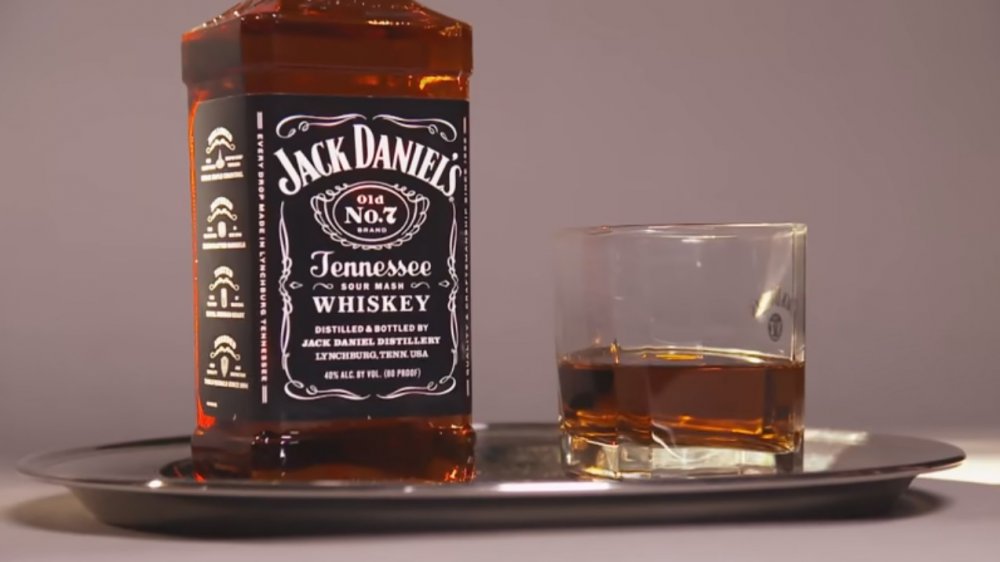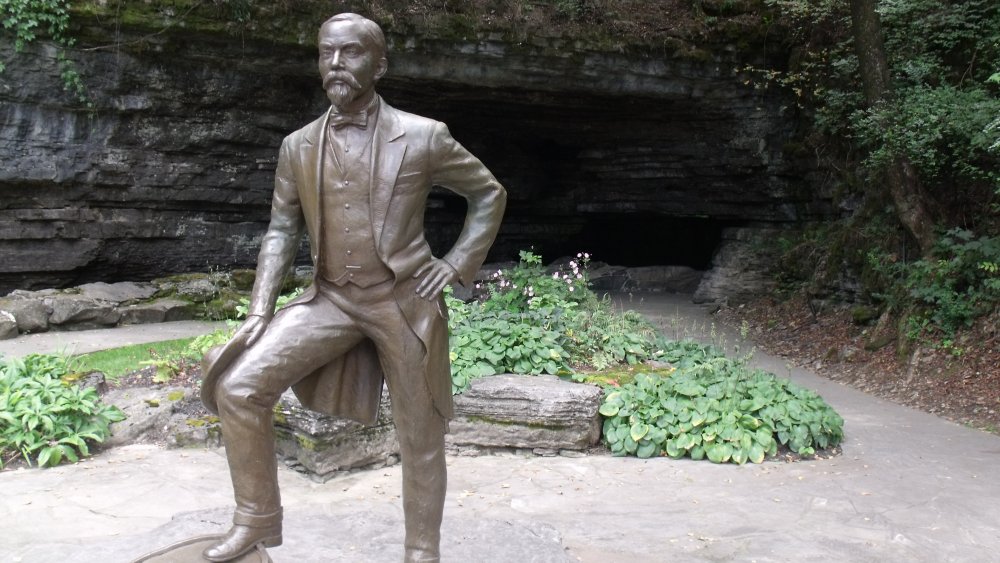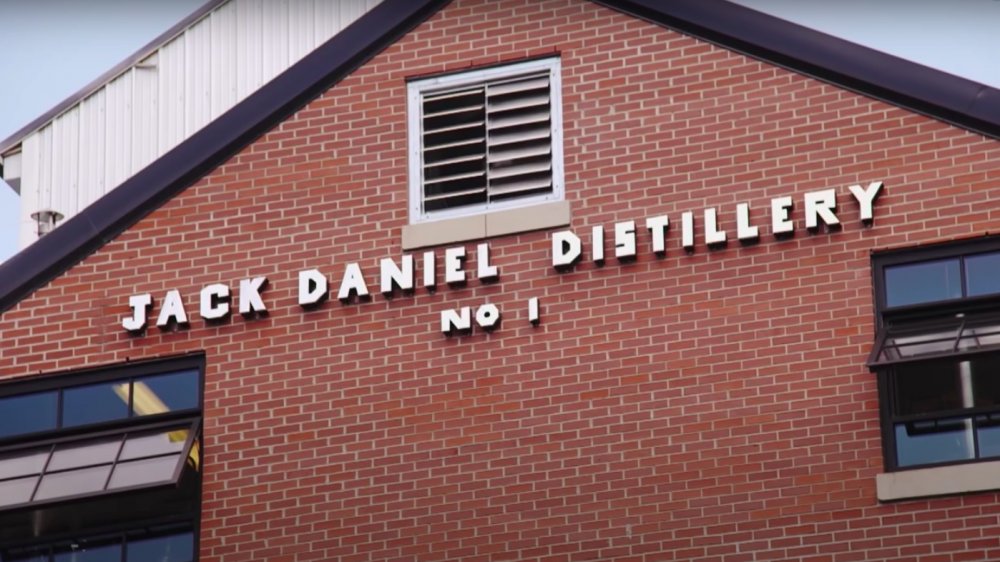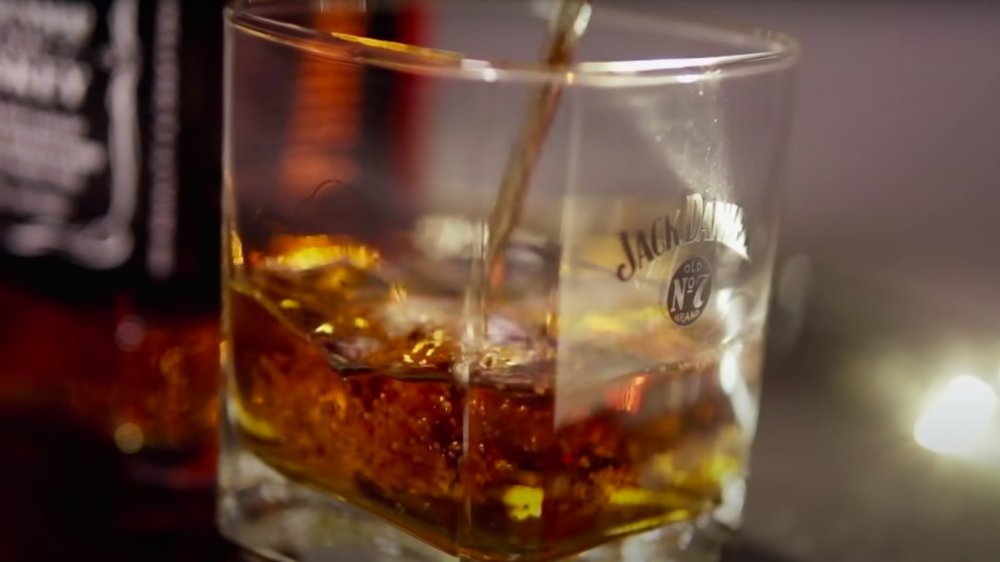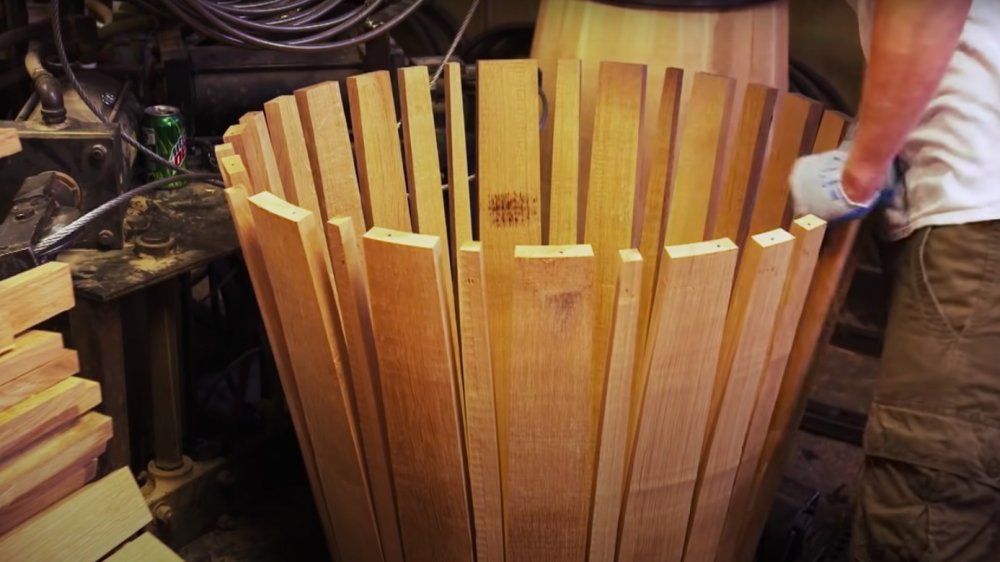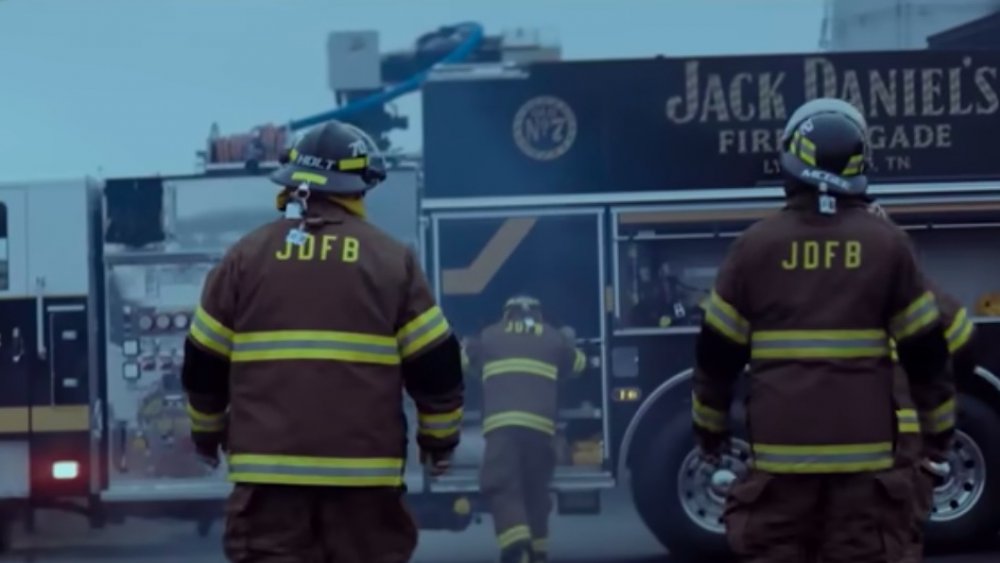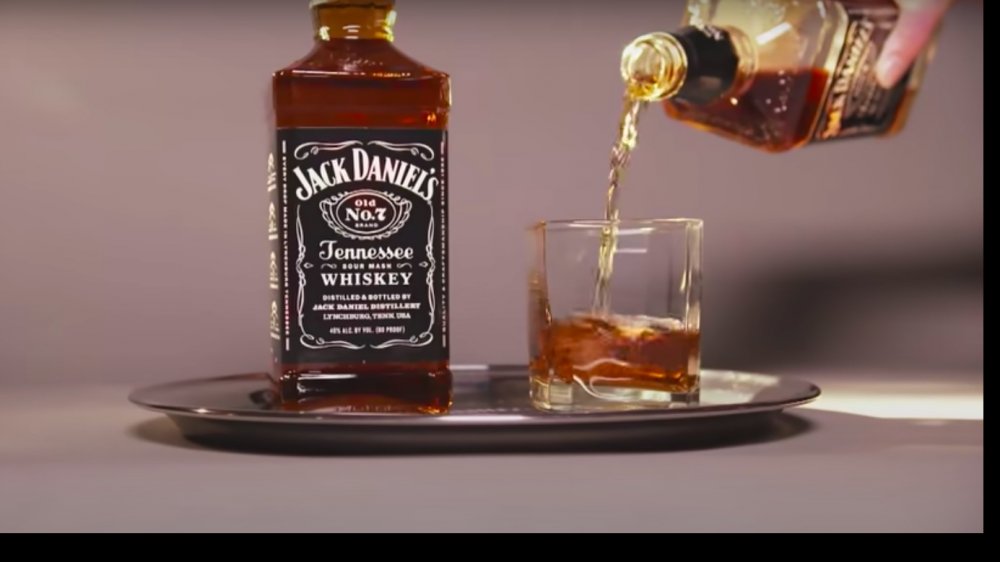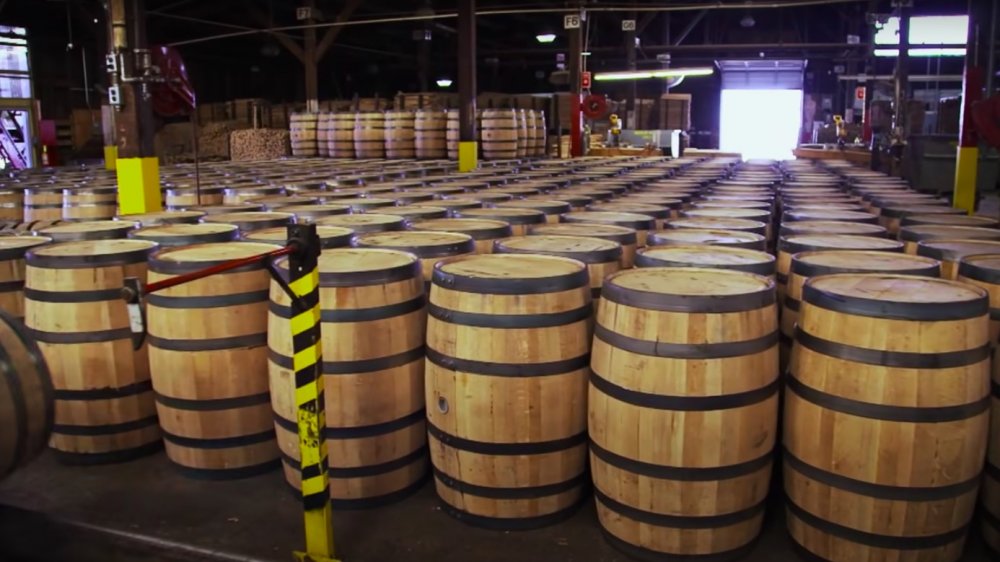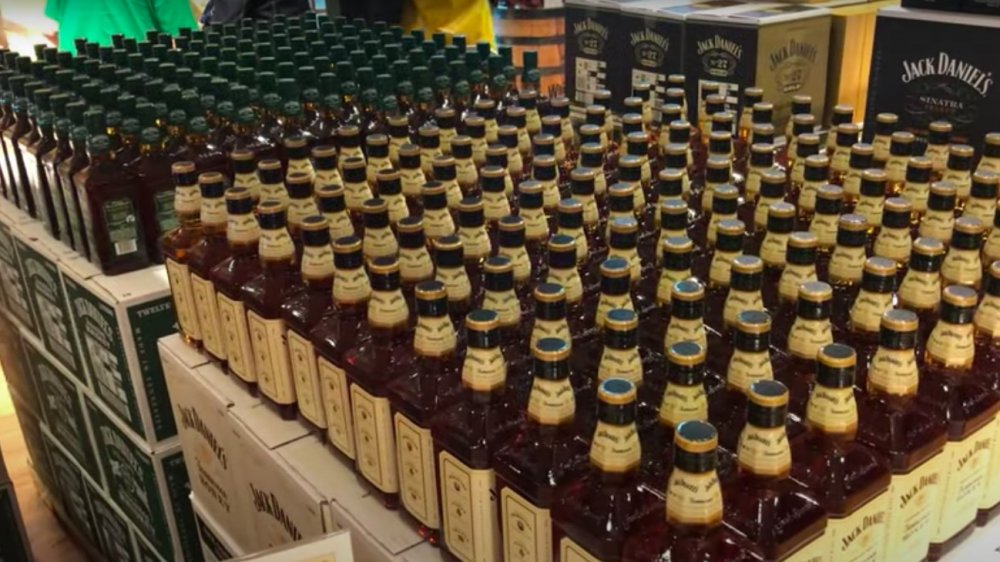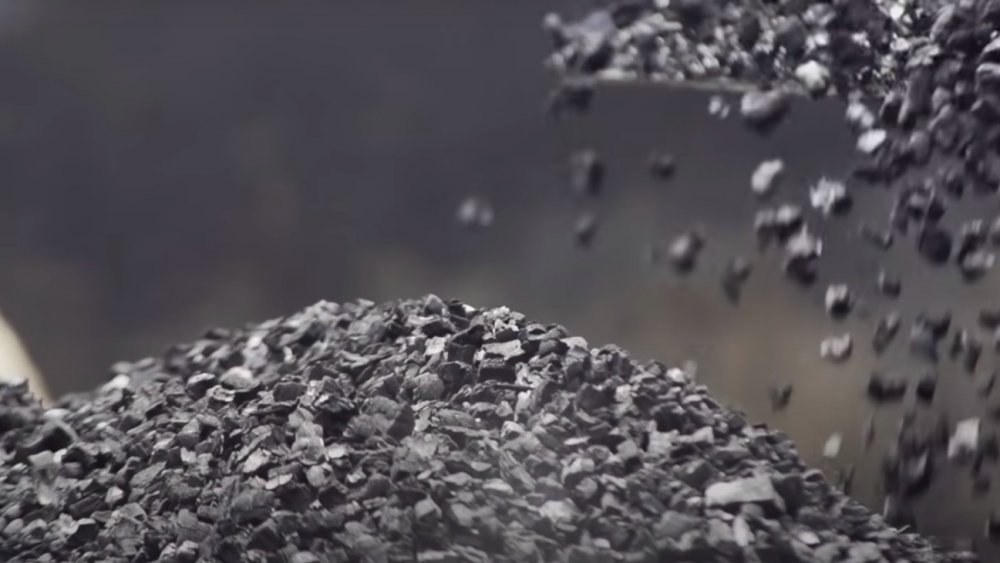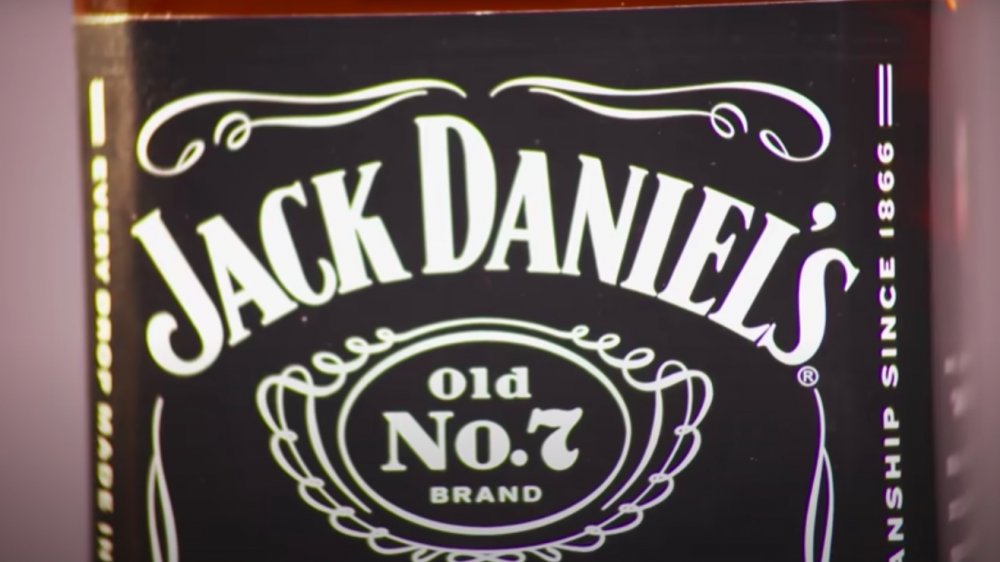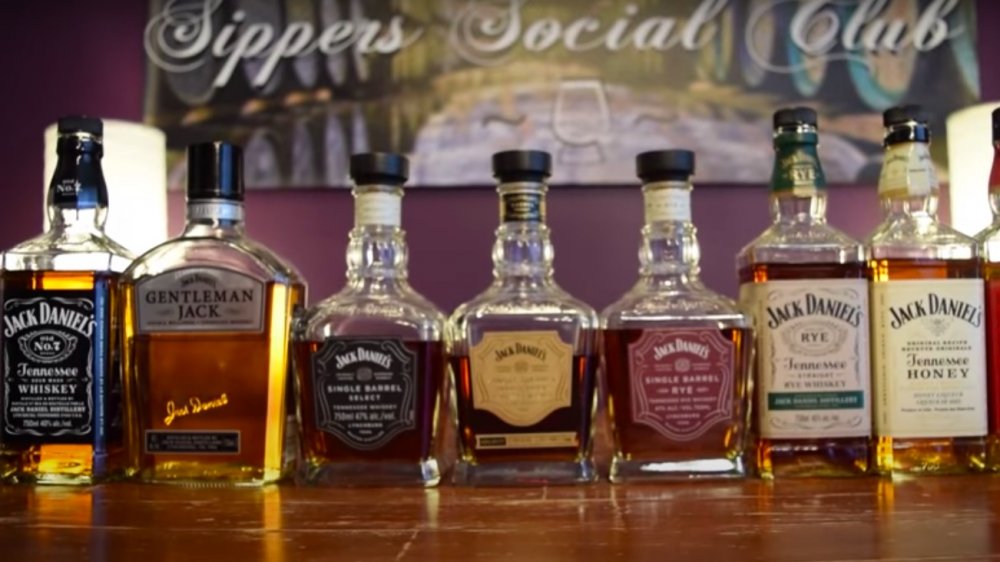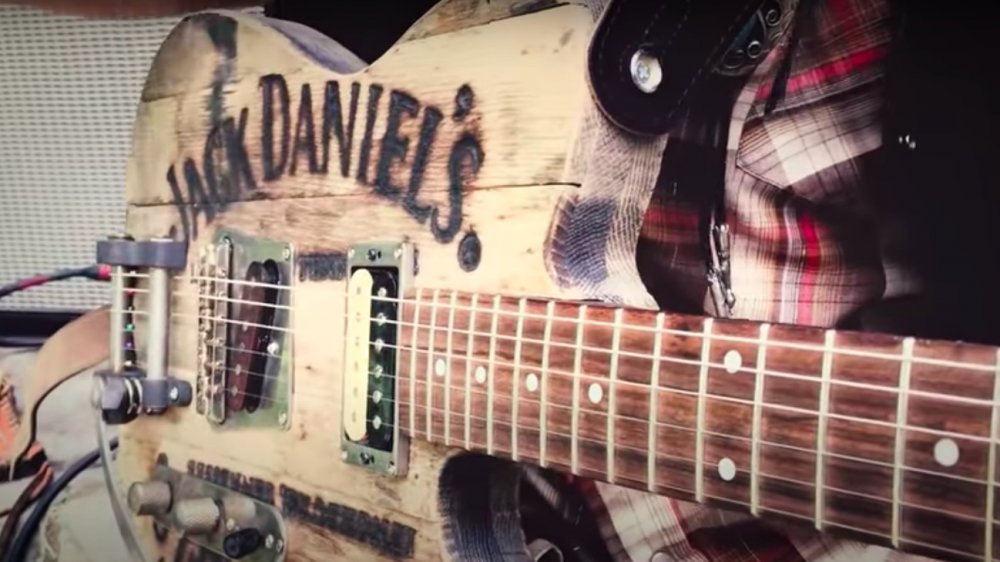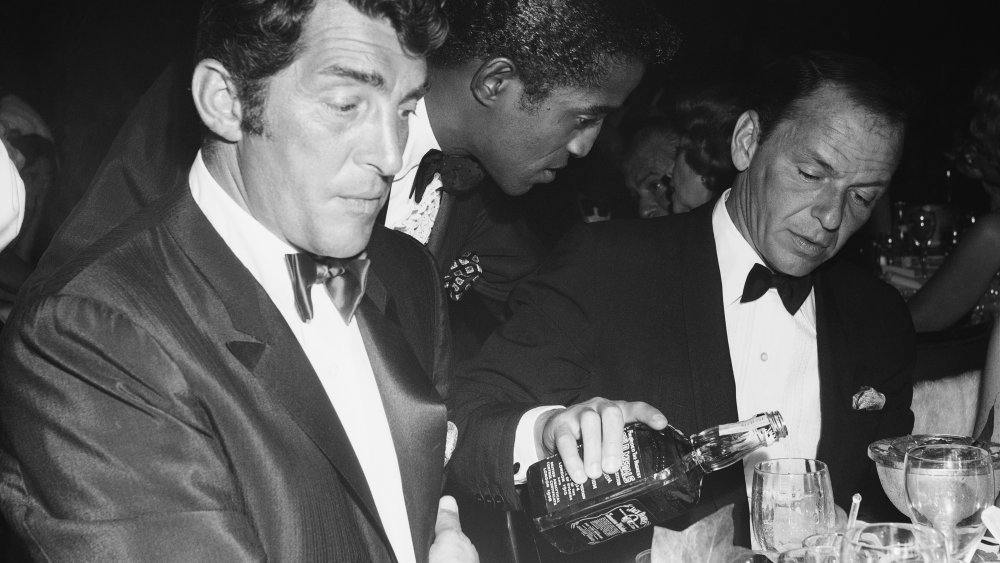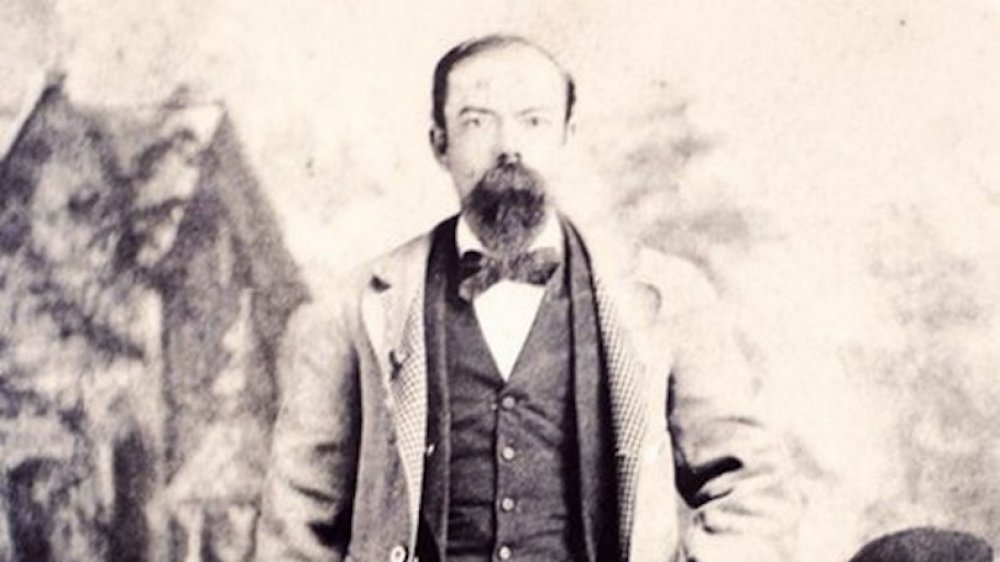The Untold Truth Of Jack Daniel's
Few spirits are as ubiquitous as Jack Daniel's, one of the world's best-selling whiskies and a brand that has become instantly recognizable. For more than 150 years, Jack Daniel's Old No. 7 Tennessee whiskey has been crafted in a single distillery, located in Lynchburg, Tennessee.
The history of Jack Daniel's, noted Business Insider, dates back to 1866, when Jasper Newton Daniel — known as Jack — purchased a distillery for the princely sum of $25. According to a distillery tour guide, Daniel bought the distillery from a local preacher who'd been taking heat from his congregation for "working for God on Sunday and then making liquor on Monday." In order to make his whiskey stand out, reported The Atlantic, Daniel developed a special process that slowly filtered the whiskey through 10 feet of charcoal, resulting in a smoother, more mellow taste.
All these years later, Jack Daniel's has carved out a special place in the hearts of whiskey lovers while capturing a serious chunk of market share, yet there's much about this iconic brand that even those who imbibe regularly may not know. Read on to discover the untold truth of Jack Daniel's.
Jack Daniel learned how to make whiskey from a slave
The history of what is arguably America's most iconic brand of whiskey began with its creator, Jack Daniel. According to The New York Times, Daniel was still a boy when he went to work for whiskey-distilling preacher Dan Call in the 1850s. Call taught young Daniel everything he knew.
Or at least that had been the official history until new information came to light that painted a very different picture. As the Times reported, in 2016 — the 150th anniversary of the Jack Daniel's brand — the company revealed it wasn't Call who taught Daniel how to distill whiskey, but Nearis Green, one of Call's slaves (the official Jack Daniel's site offers a slight variation, identifying him as Nathan "Nearest" Green). While that fact wasn't necessarily kept secret, it had only been in recent years that the distillery began to open up about Green's key role in the distillery's early days.
According to the company's website, after buying the distillery from Call, Daniel hired Green to serve as his head distiller, which would be known today as the Master Distiller.
Jack Daniel's distillery is the oldest in America — or is it?
According to the company's media site, Jack Daniel's was registered in 1866 and boasts the distinction of being the first distillery to be registered in the U.S. and is officially designated with the National Register of Historic Places.
But is it actually America's oldest distillery? A 2011 report in the Wall Street Journal noted there's no actual way to prove it, and pointed to some adjustments that Jack Daniel's was making to its iconic label to address some issues related to the company's age. As Journal reporter Barry Newman explained, a Jack Daniel's historian revealed that the only proof of that 1866 date is "one old photograph showing 'Est. 1866' scrawled in runny paint" on the wall of Jack Daniel's office, which had since been "painted over."
The rejigged label, noted Newman, maintained the distillery's claim of being established in 1866; however, since there is no other evidence, such as tax records, to verify that the company's registration is indeed America's oldest, "est. & reg." was removed from the label.
All Jack Daniel's whiskey is made with water from one spring
Each bottle of Jack Daniel's Tennessee whiskey is the result of a meticulous, painstaking process, right down to the quality of the water that's used in the distillation. In fact, notes the distillery's website, the water used in Jack Daniel's all comes from the same source, Cave Spring Hollow in Lynchburg. Jack Daniel purchased the spring and surrounding land for the then-hefty price of $2,148 after realizing the spring water would be a crucial component in his whiskey.
According to the website, this natural spring is refreshed with 800 gallons of water per minute, flowing from miles beneath the surface of the Earth, at a constant temperature of 56 degrees Fahrenheit.
There's another factor that makes the water so pure and distinctive: layers of limestone within the cave, imbuing the water with an array of minerals that "contribute to the character" of the whiskey. In addition, the limestone pulls the iron out of the water; as the distillery's website points out, iron may have its benefits, "but it's absolutely horrible if you're making whiskey."
Jack Daniel's makes its own barrels — which are only used once
The Jack Daniel's Distillery not only makes whiskey, the company also produces its own barrels in which the whiskey is aged. As the distillery pointed out on its website, the whiskey draws its "rich amber color and much of its distinctive flavor" from the wooden barrels.
Leaving nothing to chance, the custom-made barrels are crafted from American white oak. You won't find any glue or nails; instead, the barrels are held together by the pressure created by precisely arranging 33 wood staves, of varying sizes. Because this is such a painstaking and exacting process, each barrel is made by hand, not on an assembly line. The inside of the barrels are then hit with flames until they're "toasted and charred." This is necessary to extract the natural sugar from the wood so it can become caramelized, as that sugar is integral in providing the whiskey's distinctive flavor.
Jack Daniel's does not reuse its barrels. After a single use, they're then sold to "hot sauce makers, beer brewers, and Scotch whisky distillers" to be used in making their products. As the company website states, "we like to think we've done our part to help make these products just a little better."
The Jack Daniel's distillery has its own fire department
Making its own hand-crafted, single-use barrels isn't the only thing that sets Jack Daniel's apart from other distilleries. In fact, the Lynchburg distillery is also famed for having its own dedicated fire department. As it turns out, there's a very practical reason for that.
As USA Today reported, a storage facility hosting thousands of barrels of alcohol is a pretty severe fire hazard, meaning great care must be taken to ensure the distillery and its contents don't erupt in flames. "Every drop [of Jack Daniel's] is made here," Jack Daniel's Master Distiller Jeff Arnett said. As Arnett explained, if the place were to burn down, the company has no second distillery, and would suddenly have no product. "That's a lot to risk," he admitted.
With that in mind, noted the newspaper, Jack Daniel's has developed "a sophisticated fire prevention strategy" that includes its own private fire department, comprising a team of 34 volunteer firefighters. In addition, the company has invested more than $4 million into equipment such as custom-built fire trucks, foam cannons, and a $400,000 training facility in which firefighters can practice extinguishing both simulated and actual whiskey fires.
It's illegal to buy Jack Daniel's in the county where it's made
One of the enduring results of Prohibition was the establishment of so-called "dry counties" in some states, in which the purchase of alcohol is illegal. While most of America re-legalized booze after Prohibition was repealed in the 21st Amendment, some areas of the country stayed dry, and remain so today.
Therefore it's beyond ironic that Jack Daniel's, one of the world's largest distillers, is located in Lynchburg, Tennessee, situated in a dry county. According to the local Moore County News, in order for a Tennessee county to be allowed to sell "intoxicating liquor," a referendum vote must be held. Lynchburg, however, never did put that to a vote, and is still dry.
The only exception to that law is the White Rabbit Bottle Shop located within the Jack Daniel's distillery's visitor's center, where those touring the facility can purchase a "commemorative" bottle as a keepsake of their visit. According to the Moore County News, tax collected on the purchase of those bottles of whiskey benefits Metropolitan Moore County, making the situation a win-win for both the county and the distillery.
You can buy Jack Daniel's by the barrel — but it'll cost you
Anyone with an extra-hearty thirst for Jack Daniel's doesn't have to stop at buying a bottle, or even a case of the stuff. That's because the distillery also sells its iconic Tennessee whiskey by the barrel. The Jack Daniel's Single Barrel Personal Collection Program offers customers the opportunity to "hand-select" a barrel of the distillery's Single Barrel Select whiskey.
However, it's not like the distillery ships an actual barrel of whiskey to customers. The barrel's contents are first bottled — yielding approximately 240 bottles, with labels that can be personalized — and then shipped out. Also included in that shipment is a crystal decanter and rocks glasses, and a personalized barrelhead (not the entire barrel, however). In addition, a commemorative plaque is then displayed in the distillery's Personal Selection Room.
As one might expect, buying a barrel of Jack Daniel's is an expensive proposition. According to the distillery, the cost of a barrel starts at $10,000.
Jack Daniel's is America's best-selling whiskey
Jack Daniel's isn't just popular among American whiskey aficionados, it's the most popular whiskey in the country. According to Statista, Jack Daniel's ranked as America's best-selling whiskey in 2019, with annual sales of nearly $318 million. This easily topped the runner-up whiskey, Crown Royal, which boasted $311 million in sales. The brand is also popular on a global level; in 2018, reported Forbes, Jack Daniel's ranked sixth on its list of the world's best-selling whiskeys.
The 2019 annual report of Brown-Forman, the corporation that owns Jack Daniel's, demonstrated that the brand experienced a very robust year, with the various Jack Daniel's brands selling nearly 18 million cases combined. In fact, the annual report pointed to data confirming that Jack Daniel's Tennessee Whiskey, in 2018, was "recognized as the most valuable single expression spirit brand from the western world."
Because Brown-Forman diversified the brand by creating new whiskeys bearing the Jack Daniel's brand, noted the annual report, about a quarter of total sales come from these other varieties, with the classic Old No. 7 Tennessee Whiskey accounting for the other 75 percent.
The secret ingredient that makes Jack Daniel's distinctive
When it comes to knowledge of Jack Daniel's, there's likely nobody on the planet more knowledgeable than Jeff Arnett, Master Distiller at the brand's distillery in Lynchburg, Tennessee. Arnett — who's only the seventh Master Distiller the company has had since its founding — spoke with Thrillist about what goes into the whiskey's distinctive flavor.
A big part of the process, notes the Jack Daniel's website, is charcoal mellowing, in which the whiskey is filtered through special "handcrafted" charcoal, typically taking about three to five days for the whiskey to work its way through the charcoal. "It actually brings out the sweetness in the corn," Arnett told Thrillist of the process, which has been nicknamed "the extra blessing." As Arnett pointed out, the charcoal mellowing achieves in days what would take additional years of aging within a charred barrel.
However, Arnett was adamant that barrel-aging is still the most crucial aspect of the whiskey-making process. "There's no other one thing, in terms of flavor and color, that's as important as the barrel," he explained, which is why Jack Daniel's is so meticulous about producing its own.
The origins of Old No. 7 remain a mystery
Anyone familiar with Jack Daniel's whiskey will immediately recognize the words Old No. 7 on the brand's iconic label. While Old No. 7 identifies the distillery's most popular whiskey, what it actually refers to is actually unknown. In fact, even the company's Master Distiller, Jeff Arnett, has admitted that he has no idea what it means.
There has been much speculation over the years about the significance of the number seven, whether it was referring to a particular recipe, a lucky number, or even the number of girlfriends of distillery founder Jack Daniel. However, there has been no definitive proof that either — or any — of those theories have any validity.
"There's a lot of I guess mystery and myth that has formed around it whether it was a lucky number or whether it was a recipe number," Arnett told Business Insider. "At the end of the day, the truth is we don't know. Jack named the brand and it was a secret that he took to his grave."
Jack Daniel's has experimented with different varieties
While Jack Daniel's Old No. 7 Tennessee whiskey remains the brand's biggest seller, in recent years there have been other varieties introduced under the Jack Daniel's brand. Among these is Tennessee Rye, which has a higher percentage of rye (70 percent) than Old No. 7, described as being "undeniably spicy and complex yet sippin' smooth." Then there's the Single Barrel Collection, which includes Single Barrel Select (the most popular) along with Single Barrel Rye, Single Barrel Barrel Strength and Single Barrel 100 Proof.
Also available is Gentleman Jack, which has undergone a second run through the charcoal mellowing process to result in an even smoother whiskey and a "balanced oak flavor with notes of caramel and vanilla." Meanwhile, fans of legendary singer-actor Frank Sinatra will want to sample Sinatra Select, aged in specially constructed "Sinatra Barrels," with deep grooves carved into the barrel's staves in order to increase the whiskey's exposure to the charred white oak.
There are also a pair of flavored whiskeys: Tennessee Fire blends cinnamon liqueur with Old No. 7 to result in "a classic spirit with a surprisingly smooth finish," while Tennessee Honey is described as "a unique honey liqueur of our own making" that "offers a taste of the unexpected."
Jack Daniel's has always been associated with music
Jack Daniel's has had a long association with music as a sponsor of musical performances and specific bands, and that's something that goes all the way back to the distillery's founder. According to the company's website, after Jack Daniel set up his distillery in Lynchburg, Tennessee, he bought some mail-order musical instruments that he gave to some of the more musically inclined members of the community. "Every so often they'd show up at the distillery and their sweet sounds would breathe musical life into this great American landmark," noted the site.
In an interview with Thrillist, Jack Daniel's Master Distiller Jeff Arnett offered his insight into the distillery founder's affinity for music. "Jack Daniel never married and never had kids," explained Arnett. "He had two passions: whiskey and music."
According to Arnett, Daniel started his own group, the Silver Cornet Band, and would perform in Lynchburg's town square. Of course, there was also some smart business strategy behind the music, given that Daniel owned two bars in that square and the music produced lured thirsty revelers into his drinking establishments. "We have a philosophy that good whiskey and good music make good friends," added Arnett.
Frank Sinatra was buried with a bottle of Jack Daniel's
Frank Sinatra was not averse to enjoying an adult beverage, and his drink of choice was Jack Daniel's. As Jack Daniel's Master Distiller Jeff Arnett recalled for Tales of the Cocktail, in 1955 the singer carried a glass of Jack Daniel's onstage, telling the audience, "Ladies and gentlemen, this is Jack Daniel's, and it's the nectar of the gods."
In fact, Arnett credits Sinatra's loyalty to the whiskey for transforming Jack Daniel's from "a small, regional brand to being a household name." When the "My Way" crooner publicly declared Jack Daniel's to be his favorite drink, he "made us a pop-culture icon in a way," Arnett added. In fact, Tales of the Cocktail noted that the company was so thankful for Sinatra's patronage that a Jack Daniel's sales rep ensured there was always a case delivered to Sinatra's dressing room wherever he was performing.
Sinatra's affection for Jack Daniel's managed to outlive him. According to Smithsonian Magazine, he was buried with "a bottle of Jack Daniel's whiskey, a pack of Camel cigarettes, a Zippo lighter, and a dollar's worth of dimes." Why the dimes? Just in case he had an opportunity to use a payphone in the afterlife.
The bizarre circumstances behind Jack Daniel's death
One of the most distinctive aspects of the Jack Daniel's distillery tour, reported Business Insider, is that visitors to the Lynchburg, Tennessee landmark learn about the bizarre circumstances behind the death of founder Jack Daniel. They'll also get to a personal glimpse of his killer: a large metal safe.
The story goes that Daniel arrived in his office early one morning before anyone else had arrived. Needing something that was stashed in the safe, Daniel became so frustrated when he couldn't remember the combination that he gave the safe a good, solid kick — something that worked out better for the safe than the toe he injured in his angry outburst.
That injury led to an infection that spread from his toe to his foot, which had to be amputated when it became gangrenous. Unfortunately, the infection spread even further, necessitating the amputation of his entire leg. Daniel ultimately died at age 61 on October 8, 1911, from complications from the infection that began in his toe. According to Business Insider, tour guides have been known to tell distillery visitors that Daniel could have warded off infection and prevented his death if he had simply dipped his toe in a glass of his own whiskey.
